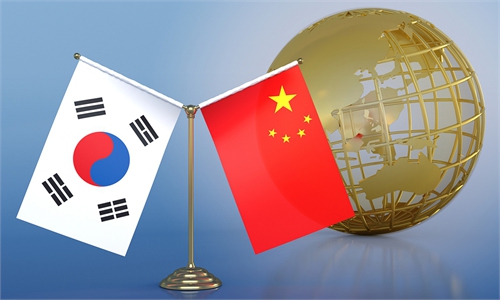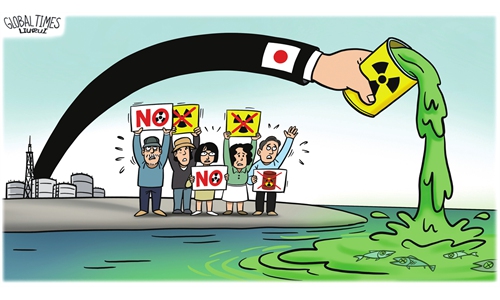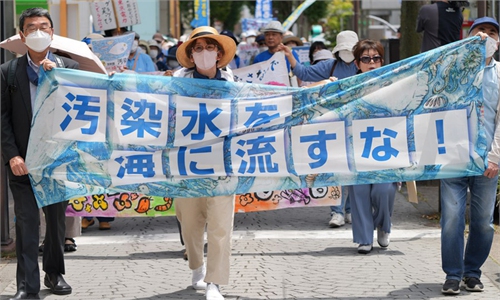Wang Yi calls on Japan, S.Korea to practice open regionalism, resist coercion
Trilateral cooperation mechanism expected to restart under joint efforts

Wang Yi (5th from left, front row), a member of the Political Bureau of the Communist Party of China (CPC) Central Committee and director of the Office of the Foreign Affairs Commission of the CPC Central Committee,and other participants of a forum meeting on cooperation among China, Japan and South Korea pose for a photo in Qingdao, China, on July 3, 2023.Photo: Xu Keyue/GT
Senior diplomats from China, Japan and South Korea on Monday expressed willingness to make joint efforts to restart trilateral cooperation mechanism and boost regional economic and social recovery, during their speeches at a trilateral cooperation forum that was held offline for the first time since 2020.
China, Japan and South Korea, as well as other Asian countries, should practice open regionalism, promote inclusive Asian values, cultivate strategic autonomy, safeguard regional unity and stability, resist the Cold War mentality, and avoid coercion by hegemony, said Wang Yi, a member of the Political Bureau of the Communist Party of China (CPC) Central Committee and director of the Office of the Foreign Affairs Commission of the CPC Central Committee, during his speech at the 2023 International Forum for Trilateral Cooperation in Qingdao, East China's Shandong Province on Monday.
Wang said this forum was held offline for the first time since the COVID-19 pandemic, and we need to send a clear signal from Qingdao that cooperation among the three countries will resume.
China will vigorously promote opening-up at a higher level, welcome Japan and South Korea to board the express train of China's high-quality development, and create a better future for the three countries and Asia, Wang said.
However, in recent years, some major powers outside the region have deliberately played up ideological differences and created various exclusive cliques in an attempt to replace cooperation and unity with confrontation and division in order to realize their own geopolitical interests. If this trend is allowed to develop, it will not only seriously interfere with the smooth progress of trilateral cooperation, but also increase tension and confrontation in the region, Wang warned.
Also, when meeting with the guests attending the forum, Wang noted that Europeans and Americans can't distinguish between Chinese, Japanese and South Koreans. No matter how yellow our hair is dyed or how sharp we change our nose, we can't become Westerners. We should know where our roots are, he told the main group of guests, stressing cooperation between the three countries can revitalize Asia and benefit the world.
In order to revitalize Asia amid the changing times, China suggests that on major issues concerning the foundation of bilateral relations, such as historical issues and the Taiwan question, we keep our promises and abide by the spirit of the four political documents between China and Japan and the joint communiqué on the establishment of diplomatic ties between China and South Korea with no ambiguity or backtracking, the Chinese senior diplomat told the forum.
We must resolutely resist "decoupling" and chain breaking under various names, maintain regional industrial systems that complement each other's strengths, and create a good environment and stable expectations for business operations, Wang noted.
Wang called on the three countries to speed up negotiations on the China-Japan-South Korea Free Trade Area, further enhance trade liberalization and facilitation, and play a leading role in the East Asian economy.
Also, commenting on Japan's plan of dumping nuclear-contaminated wastewater into the sea, Wang urged that it "must be handled carefully with in-depth coordination with neighboring countries and the international community" as it concerns the marine ecological environment and the safety of people's lives.
Separately, South Korean Foreign Minister Park Jin made a virtual speech during the forum, saying that his country will make efforts to restart the trilateral cooperation mechanism.
Park extended an invitation to Wang in his speech, saying "when visiting Seoul, we can climb the Bukhansan mountain together and go down the mountain to taste jajangmyeon [noodles]."
Wang Yi said in his speech that he had in-depth strategic communications with Park in Qingdao last year, and thanked Park for inviting him to climb mountain.
Wang said he would like to invite Park again to Shandong to climb Taishan Mountain together, which would "broaden our horizons and define the direction of our efforts."
Wang Yi also mentioned in his speech that Yoshiro Hayashi, late father of Japanese Foreign Minister Yoshimasa Hayashi, had been engaged in the cause of China-Japan friendship for many years and was the chairman of the Japan-China Friendship Parliamentarians' Union for many years. "I think at that time, the young Yoshimasa Hayashi was influenced by it and had a unique perspective on promoting China-Japan friendship. We hope that he will make efforts to improve China-Japan-South Korea relations," Wang said.
Senior politicians, scholars and experts from the three countries attended the forum on Monday, including former speaker of the National Assembly of South Korea Kang Chang-hee, former Japanese commissioner of the Agency for Cultural Affairs Seiichi Kondo and Secretary General Ou Boqian of the Trilateral Cooperation Secretariat.
Li Bing, associate editor of the Institute of Northeast Asian Studies, Tianjin Academy of Social Sciences, told the Global Times on Monday that this event with senior diplomats showing up demonstrates that the three governments attach great importance to the their trilateral relations.
The three countries are the economic centers in Northeast Asia with a huge development potential. China and Japan are the second and third largest economies in the world, and South Korea is one of the most important economies in the world, which make the development prospects of trilateral cooperation more than 1+1+, Li said.
But under the influence of external forces, their cooperation has not yet achieved the great synergy effect that it should have, he noted.




